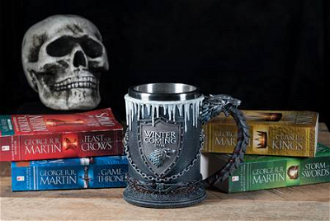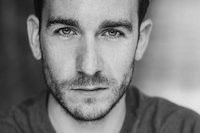Game of Thrones: Curiously relevant for our times

What is a Targaryan? Are you concerned that "winter is coming"?
If you don't know then you are not a Game of Thrones watcher. But millions around the world are. Don't worry no spoilers here about Season 8!
Based on the novels by George RR Martin, Game of Thrones is fantasy fiction, but with a flavour of medieval legend, as ambitious and power-hungry lords and ladies vie for power, unleashing a violent and dangerous game. After seven seasons, 68 episodes, a bunch of blood-soaked character deaths and years of internet-breaking speculation, Game of Thrones has returned today for its eighth and final season. Simultaneously broadcast in 170 countries, the cast has promised it will be "truly brutal".
I have been a critic over the past eight years. How is so much money available for this show? Season 8 episodes have cost $15 million each. A couple of episodes is about the same money raised in Britain over recent weeks to respond to the Southern Africa Cyclone. The incredible violence, incest and family murder were all too much for me. If I saw a roasting alive by dragons, limbs being chopped off, bloodshed in battle, torture, mass poisoning or a horse beheading then I was out of the room. There's a generational divide. To me Jon Snow presents Channel 4 news, but to young people Jon Snow is King of the North. The fascination with it was all a mystery to me?
However, I recently joined one of my sons to review Season 7, and found that the quality of blockbuster film making, stunning visual effects and engaging acting was hooking me in. More than that, I began finding a curious relevance in the characters and story lines.
Games of Throne is set in an anarchic world of seven kingdoms, each ruled by a family. And there is a wild area beyond 'The Wall', an ice barrier in the North. It is a world with no rules, and revenge is practised over mercy. It gives insight to a society without bench marks and no multilateral institutions, as we have today, to try and enforce ethical behaviour in rulers. Today, we see countries and regions where powerful leaders can slaughter opponents, but at least we have the UN Human Rights Declaration as a yardstick. Yet, perhaps Game of Thrones appeals because it bluntly and accurately reflects realities in today's world, which is currently marking the 25th anniversary of the Rwandan genocide and the desperation of millions in Venezuela amidst disorder and starvation. And is there any greater treachery than humanitarian aid for Yemen's poor while selling arms to those bombing them? While Game of Thrones is a world of swords, magic and dragons, the story lines often parallel our world and history. In fact, the writer was very much influenced by such feuding as the Wars of the Roses, the betrayal of the massacre at Glencoe and the building of Hadrian's Wall across Northern England as a barrier against undesirable peoples. I certainly appreciate today's ethical institutions which make our lives more just, tolerable and secure.
But yet there is plenty of room for improvement in our modern world. Look at Lord Petyr Baelish (Aidan Gillen), otherwise known as Littlefinger. His is a rags-to-riches story, and as he says himself, he has climbed the ladder of chaos. Game of Thrones teaches that to succeed you must follow the example of those who don't let emotions impact their judgement. Survival in Westeros and perhaps in today's financial world is about actions that benefit you and help you move forward, not that support others at your own expense.
But what redeems Game of Thrones for me? In Season 7 we saw tender moments of forgiveness and vulnerability, with hero Jon Snow's (Kit Harington) character in particular trying to bring the different houses together to address a common threat, that of the Night King and his army of white walkers beyond the wall. Queen Daenerys (Emilia Clarke) uses her dragons to kill opponents and crucifies adversaries, but she also frees slaves and, like Jon, she feels it is important to listen to wise advisors and to keep her word. These characters have the usual mixture of good and bad in them. And we see ordinary people doing extraordinary and generous things, such as Samwell Tarly (John Bradley) curing a man of the greyscale skin condition, which is infectious and dangerous. And was that Ed Sheeran as a soldier in the forest with a group of affable soldiers sharing song and food with a stranger?
Perhaps most intriguing is the character of Tyrion Lannister, played by Peter Dinklage, a dwarf. Tyrion is compassionate and intelligent, a talented diplomat, but always outcast within his own powerful family. He has been despised his whole life by his father and hot-tempered sister, Cersei Lannister (Lena Headley). Yet, he becomes a skilled power broker and right-hand man to Queen Daenerys. "If we want to create a new, better world, I'm not sure deceit and mass murder are the best ways to start" Tyrion warns her. And he reflects, "Death is so terribly final when life is full of possibilities". He favours a gentler world where trust and human dignity are raised.
A difficult issue for me is - does violence on the screen de-sensitise to violence? The series depicts many instances of sexual violence against women. Rape is common and brothel scenes rife. Most shocking of all was the Walk of Shame of Queen Cersei in Season 5. The fallen queen is made to walk naked through the streets of King's Landing, after confessing to adultery, and pelted with insults and rotten food. Cersei had been imprisoned by a violent religious group where patriarchy was rife, and when she regained power she exerted terrible revenge on them. The walk was filmed in Dubrovnik, on Baroque stairs leading up to the Jesuit Church of St. Ignatius of Loyola and 17th-century Jesuit College. When woman are presented as powerful, the viewer can feel uncomfortable. At the end of the last series we learnt that Queen Cersei has no intention of keeping her word to join the alliance against the white walkers. Jon Snow's sister Arya Stark (Maisie Williams) seems to be no more than a sword-wielding executioner.
The dragons are largely used as weapons of mass destruction. In Game of Thrones, if you have such weapons then you use them against your enemies. Just a few days ago the bulletin of Atomic Scientists reprinted a 2014 essay which suggested that the series has "a surprising number of lessons about peace and security for real life". The mass destruction that accompanies dragonfire makes the dragons akin to heavy bombers with nuclear payloads. Yet, Daenerys ends up relying on her army to conduct counterinsurgency operations and diplomacy to reach an uneasy peace with her neighbours. Martin has said his stories try to bear witness to not just the glory of war, but the ugly consequences of violence - on enemies, on innocent bystanders, and, ultimately, on oneself. Weapons and dragons may help one conquer, but they are not guarantors of peaceful rule and stability. "Build a world that's different from the shit one they've always known" Jon advises Daenerys; "But if you use your dragons to melt castles and burn cities, you're not different, just more of the same".
Getting back to the broad sweep of Game of Thrones, it has had very positive spinoffs, for example, bringing employment and attention to Northern Ireland. Young people who know little about "the troubles" will know about the beautiful filming locations for Game of Thrones - the Antrim Coast and 'Dark Hedges', Country Down's Castle Ward and Tollymore Forest Park.
But I think it is also a powerful metaphor which carries a warning that we should heed. The end of the last season flagged up that the Night King and his army of white walkers have begun to destroy The Wall. This wall of ice has protected those south of it for centuries. White Walkers could ravage the land and turn whole populations into refugees and zombies. While wars and conquests have occupied every season of the show, a quiet catastrophe has been looming in the northern icy region. And this is true of our society. While humans have a destructive tendency to fight among themselves the world around them is getting obliterated by a larger threat…. climate change. Arctic Ice is speedily melting. Who are the Jon Snows of our time who see the larger threat?
The slogan 'Winter is coming' is meant literally as well as metaphorically in Game of Thrones. Let us see what new insights for our society Season 8 will bring.
Watch the official trailer here: www.youtube.com/watch?v=rlR4PJn8b8I



















